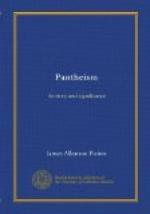[Sidenote: Pantheism in Ancient Egypt]
[Sidenote: Permanent Effects of Prehistoric Animism.]
[Sidenote: Isis, according to Plutarch.]
Egyptian Religion need not detain us. For though, there are clear traces of Pantheistic speculation among the Priests, it can scarcely be contended that such speculations had the same influence on the cultured laity as the teaching of the Rishis had in ancient India. But the truth seems to be that the oldest popular theology of Egypt was only a variety of Negro animism and fetishism.[9] Yet these grovelling superstitions, as is often the case, evolved in unbroken continuity a higher faith. For, in the attempt made to adapt this savage cult to the religious needs of various districts, all alike gradually advancing in culture, the number and variety of divinities became so bewildering to the priests, that the latter almost inevitably adopted the device of recognising in parochial gods only so many hints of one all-comprehensive divine energy. Not that they ever embraced monotheism—or the belief in one personal God distinct from the Universe. But if Plutarch be accurate—as there seems no reason to doubt, in his record of an inscription in a temple of Isis—they, or at least the most spiritual of them, found refuge in Pantheism. For the transfigured and glorified goddess was not regarded as the maker of the Universe, but as identical with it, and therefore unknowable, “I am all that hath been, is, or shall be; and no mortal has lifted my veil.” The prevalence of such Pantheism, at least among the learned and spiritual of ancient Egypt, is, to a considerable extent, confirmed by other Greek writers besides Plutarch. But the inscription noted by Plutarch gives the sum and substance of what they tell us.




